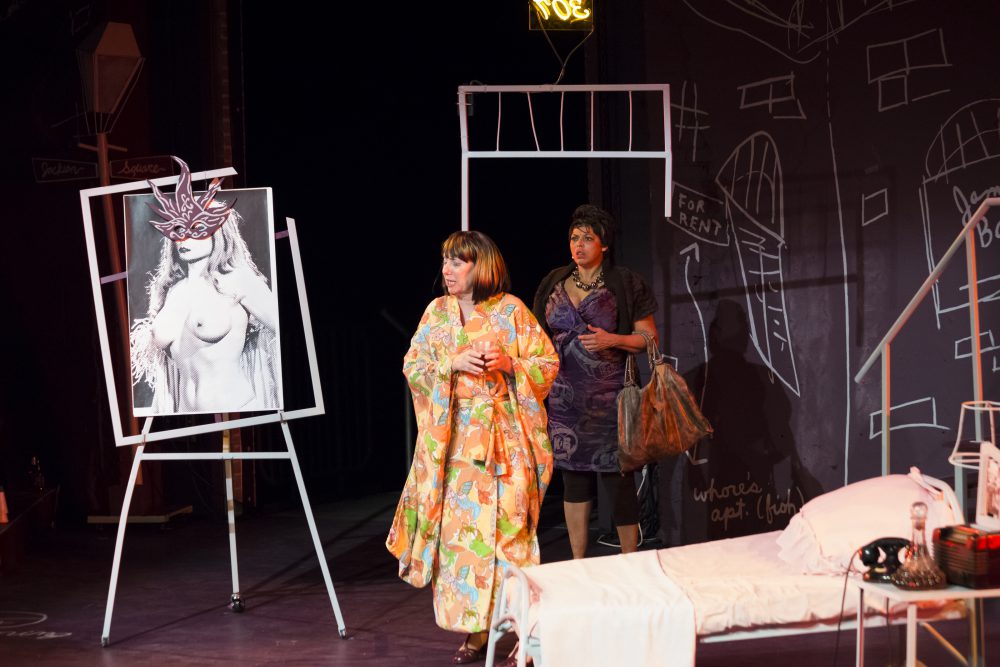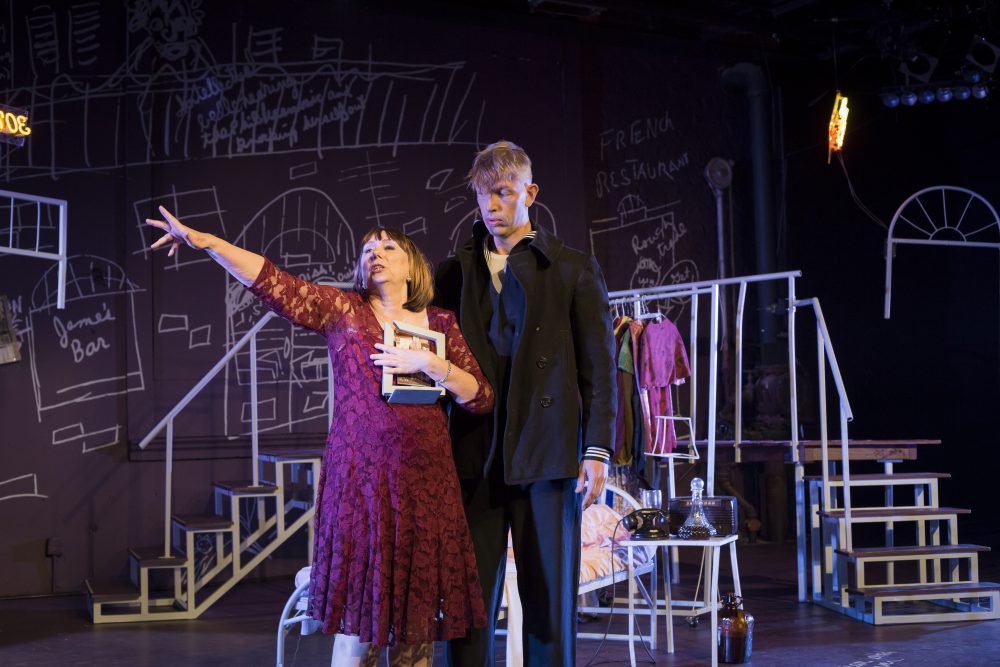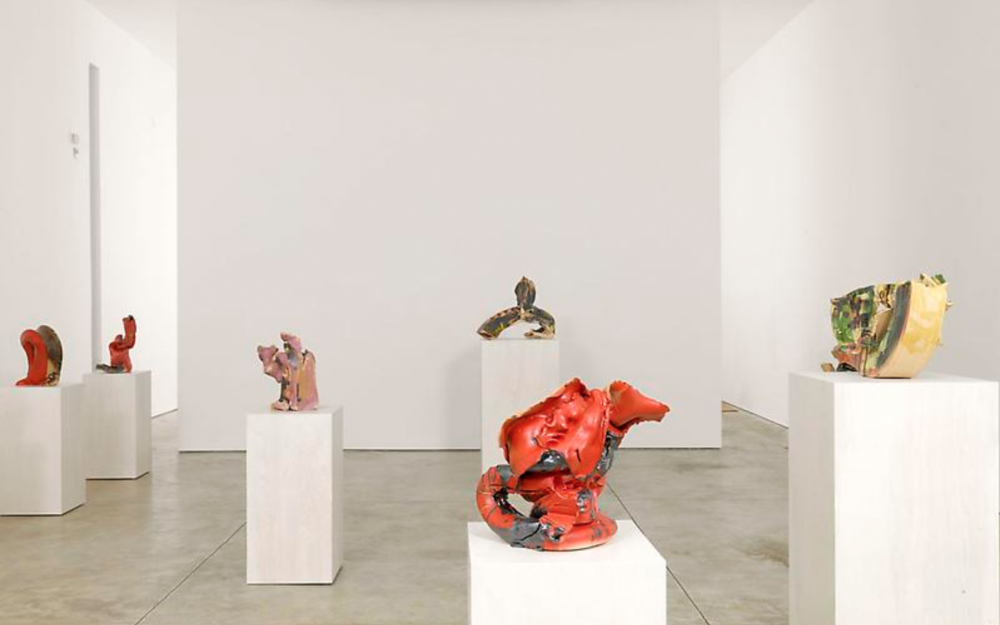A Partial Guide to Camp: Tennessee Williams’ “The Mutilated”
Part of his ongoing series of essays exploring Camp and contemporary culture, Laurence Ross discusses a recent production of an often overlooked Tennessee Williams play.

Mink Stole and Donna Duplantier in director Cosmin Chivu’s revival of Tennessee Williams’ The Mutilated at the Contemporary Arts Center, New Orleans. Photo by Morgan & Owens.
Maybe ninety percent of the freaks will just be freaks, ludicrous and pathetic and getting nowhere but into trouble.
Eliminate them, however—bully them into conformity—and nobody in America will ever be really young any more and we’ll be left standing in the dead center of nowhere.
Tennessee Williams, “‘Something Wild…’”
While watching The Mutilated, written by Tennessee Williams in 1966 and revived by director Cosmin Chivu, I felt perfectly at home. The play takes place on a Christmas Eve in the French Quarter in a world of social outcasts whose wills oscillate between strength and weakness. Watching the play at the Contemporary Arts Center, I couldn’t help but see faces that have become familiar to me. I speak not of the actors themselves, but of Williams’ characters who make up the house-of-cards structure of downtown New Orleans: queens and jacks, hearts and clubs, all leaning on each other for support whether we like it or not.
The main protagonists—Celeste Delacroix Griffin (Donna Duplantier) and Trinket Dugan (Mink Stole)—are feuding friends. Their relationship has soured due to their unhealthy codependency and a string of hurt feelings. We’re told it’s over, but we don’t believe it. Celeste, recently released from jail for shoplifting, is the embodiment of the New Orleans hustle: ready to get a new dress, a stiff drink, or a few dollars wherever she can. Trinket, bestowed with a steady flow of oil money, feels different hunger pangs: intimacy and self-esteem are her wants, as she is plagued with identity issues in the wake of a mastectomy.
This “mutilation,” as the lost breast is constantly referred to, runs throughout the play as an open metaphor for all one might wish to conceal in the face of fear and rumor. In 1966, when the play was written and first performed, people didn’t talk about breast cancer, and a mastectomy could become a source of great shame. Williams could closely relate to the guarding of a secret, as he grappled with his own sexuality at a time when rumor could spell ruin. Thanks to the insight of Kenneth Holditch, a friend of the writer and a scholar of his life and work, we know that Williams set the stage for The Mutilated in the city not only where he had sex for the first time, but also where he finally felt he fit in. Williams’ mutilated characters stand in for all who have found themselves on the outside, those too eccentric for the heartland of America.
When the show first opened on Broadway, The New York Times ravaged the play in a rather caustic review. Critic Stanley Kauffmann saw a “central vacancy” in the play and stated that its significance amounts to a “boozy delusion.” Kauffmann missed the point entirely, and The Mutilated closed after only seven performances. Presented as part of a bill titled Slapstick Tragedy, it seemed doomed to fail. Tragicomedy, as a genre, can be polarizing; add in Williams’ decidedly queer Camp sensibilities, and you end up with a script that will read hilariously, if devastatingly, poignant to some and the glossy surface of shallow depths to others.

Director Cosmin Chivu’s revival of Tennessee Williams’ The Mutilated at the Contemporary Arts Center, New Orleans. Photo by Morgan & Owens.
The Mutilated was written just two years after Susan Sontag wrote her famous (yet often-contested) essay “Notes on ‘Camp.’” Sontag laid bare that Camp embraces artifice, and even she, at times, seems to misconstrue this artifice for vacancy. But Camp is as fiercely playful as it is serious, creating an aesthetic that is often regarded worthless. (That is, if a critic takes the time to regard it at all.) Perhaps most befitting Williams’ play is Sontag’s suggestion that Camp often flattens any critical hierarchy, a flattening that decidedly rails against the impulse of the critic: “Camp taste turns its back on the good-bad axis of ordinary aesthetic judgment. Camp doesn't reverse things. It doesn't argue that the good is bad, or the bad is good. What it does is to offer for art (and life) a different—a supplementary—set of standards.”
Considering that The Mutilated is, at heart, a Christmas story that loves all its characters despite their flaws and fussy attitudes, a standard dichotomy of judgment seems particularly irrelevant. The triumph of the play does not belong to a hero or a villain, to the noble or the cold-hearted. Instead, the play’s chorus of carolers repeatedly proclaim the happy miracle of The Mutilated to the audience who presumably needs the message to be reinforced: “I think the strange, the crazed, the queer / Will have their holiday this year.” We can easily get behind a Christmas story in which a boy on crutches receives the kindness of a reformed man. But what about a story in which a sex worker and her on-again-off-again benefactor rekindle their relationship?
Perhaps this is why Mink Stole is the ideal person to play Trinket. Best known for her roles in John Waters’ oeuvre, the actress is closely aligned with a history of Camp film, aesthetic controversy, and Waters’ “filthy” world—a world that begs for judgment to be suspended, if not dispensed. Stole, like Waters, hails from Baltimore, perhaps the only city in America that seems cousin to New Orleans. Both cities offer rawness and pageantry, decay and decadence, that can swirl and coalesce into tragic, comic beauty.
When, at the end of The Mutilated, Celeste and Trinket have finally reconciled, they are visited by what they believe to be the spirit of the Virgin Mary. They extend their hands; they touch the invisible hem of her robe; they cry. However, the audience sees and hears what the characters do not—the ominous Jack in Black, a ghostly figure of fate who sings of decks and dice, tricks and Fate’s wheel. This is a case of mistaken identity; this is a case of misplaced faith. In Chivu’s production, Jack in Black lifts a skulled mask (rather than the hat written in Williams’ stage notes) and sings: “Expect me, but not yet, not yet!” And in a city where sea birds fly ominously over the French Quarter, in a city where the water is always near, this tragicomic ending rings clear and wishes all of us a Merry Christmas—at least this year.
Editor's Note
Tennessee Williams’ The Mutilated was performed at the Contemporary Arts Center November 19 - 22, 2015. Mink Stole also stars in It’s Merry Christmas, Dammit on December 5 at the AllWays Lounge and Theatre (2240 St. Claude Avenue) in New Orleans.



